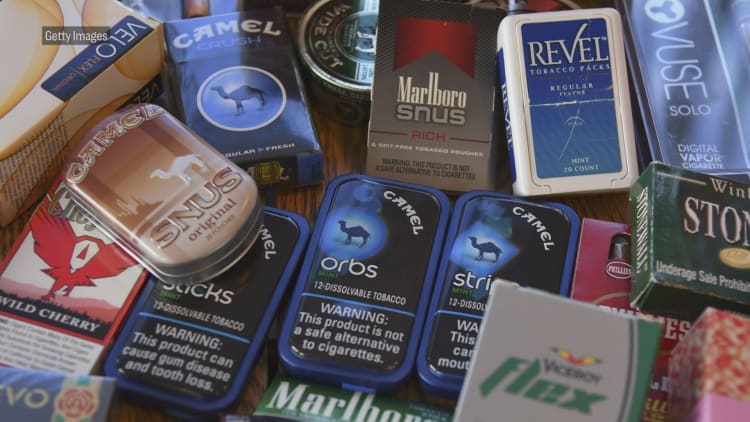
Philip Morris International shares plummeted 16 percent in the company's worst day since it spun off from Altria in 2008, after PMI posted mixed first-quarter results and said growth of iQOS, its heat-not-burn tobacco product, slowed in Japan.
iQOS warms tobacco to a temperature that's high enough to emit an aerosal but not high enough to cause combustion, the chemical process that makes smoking conventional cigarettes so harmful. It's crucial to PMI's strategy of moving beyond cigarettes.
The product is available in more than 30 markets. PMI has touted Japan as an example of how successful iQOS could be. It's become wildly popular in the country, though this quarter, device sales were slower than the company's expectations, Chief Financial Officer Martin King said Thursday on a call with analysts following the release of first-quarter earnings results.
The company posted adjusted earnings of $1 per share, topping the 90 cents per share analysts polled by Thomson Reuters anticipated. PMI missed revenue estimates at $6.90 billion, compared with the $7.03 billion the Street expected.
PMI was anticipating market share growth would plateau at some point this year because the company knew it was close to saturating the early adopters and innovators, he said. But it's coming "a bit earlier in the year than what we had foreseen, and this isn't unusual."
"We've looked at trends of other new products and new successful launches in other situations, and there's almost always periods where you get surging adoption, and then it plateaus a bit as you enter some new consumer dynamics and categories," King said. "And then it tends to resume some growth rates. And we think we're at one of those points."
He said PMI doesn't know how long this plateau will last. The company is going to adjust its plans, including speed up some initiatives to earlier in the year and adjust its messaging to consumers.
Since launching in Japan in late 2014, PMI has reached 16 percent of market share, which "is absolutely phenomenal," King said.
"It was just an issue of whether this torrid pace of growth would continue uninterrupted or whether we would hit some points at which we need to adjust a bit and approach consumers in a little bit different manner," he said.
Because PMI isn't seeing a surge in device sales, sales of Heatsticks, tobacco sticks that go inside the iQOS device, "are likely to be a little bit lower" than it forecast at the end of last year. If the situation in Japan persists, he said, then the volume of heated tobacco unit sales will be closer to the range of 55 billion to 60 billion instead of the previously estimated 60 billion.
"It's hard to say exactly at this point. We don't know how this trend or the dynamics is going to develop, but we're just calling out kind of a more cautious situation to give us the time and the resources to tackle these different consumer segments in the right way," he said.
PMI is currently awaiting decisions from the U.S. Food and Drug Administration on whether it can sell iQOS and whether it can promote it as an option that's less risky than conventional cigarettes.
If approved, Altria would receive sole distribution rights to market and sell it in the U.S. Its shares slid nearly 6 percent. British American Tobacco, which sells its own heat-not-burn product, Glo, shares fell nearly 5 percent.
Uncertainty about the long-term outlook for PMI's iQOS business appears to be weighing on investor sentiment, and the company's remarks around the issue appear to have not added sufficient clarity, Piper Jaffray analyst Michael Lavery wrote in a note to clients. However, he called Thursday's sell-off "overdone."


